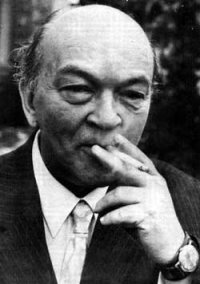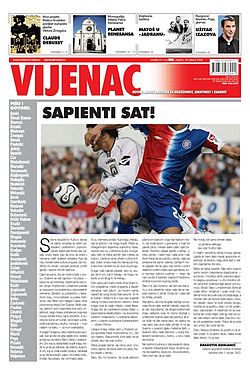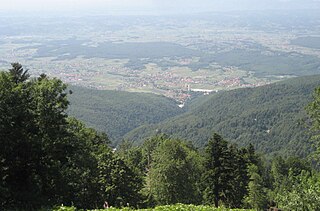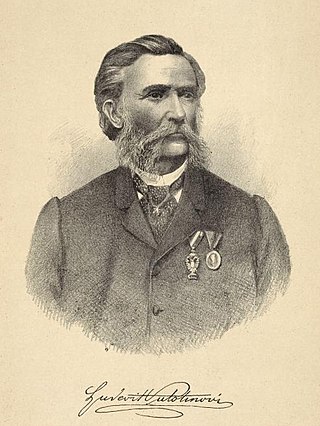This article needs additional citations for verification .(June 2022) |
Kolo is a Croatian literary magazine published by Matica hrvatska.
This article needs additional citations for verification .(June 2022) |
Kolo is a Croatian literary magazine published by Matica hrvatska.
The magazine was founded by Stanko Vraz in 1842. Matica hrvatska became its publisher in 1847. In 1851, the publishing of Kolo temporarily ceased (replaced by Neven, which was in turn replaced by Vienac ). [1]
The popular Bosnian Serb poem, and later song, Emina by Aleksa Šantić was first published in Kolo in 1902. [2]

Editors of Kolo have included Marijan Matković, Joža Horvat, Slavko Kolar, Gustav Krklec, Vjekoslav Kaleb, Vlatko Pavletić, Milivoj Slaviček, Miroslav Vaupotić, Igor Zidić. [3]

The Croatian Spring, or Maspok, was a political conflict that took place from 1967 to 1971 in the Socialist Republic of Croatia, at the time part of the Socialist Federal Republic of Yugoslavia. As one of six republics comprising Yugoslavia at the time, Croatia was ruled by the League of Communists of Croatia (SKH), nominally independent from the League of Communists of Yugoslavia (SKJ), led by President Josip Broz Tito. The 1960s in Yugoslavia were marked by a series of reforms aimed at improving the economic situation in the country and increasingly politicised efforts by the leadership of the republics to protect the economic interests of their respective republics. As part of this, political conflict occurred in Croatia when reformers within the SKH, generally aligned with the Croatian cultural society Matica hrvatska, came into conflict with conservatives.

The Matica srpska is the oldest Serbian language independent, non-profit, non-governmental and cultural-scientific Serbian national institution. It was founded on June 1, 1826, in Pest by the Serbian habsburg legislator Jovan Hadžić and other prominent members of the Serbian Revolution and National Revival. The Matica was moved to Novi Sad in 1864. It is the oldest matica in the world.

Matija Ban was a Serbo-Croatian poet, dramatist, and playwright. He is known as one of the earliest proponents of the Serb-Catholic movement in Dubrovnik.

Enver Čolaković was a Bosnian novelist, poet and translator, best known for his 1944 novel The Legend of Ali-Pasha. During the later stages of World War II he served as a cultural attaché to the Independent State of Croatia embassy in Budapest. After the war he spent the rest of his life in Zagreb, where he published a number of literary translations from Hungarian and German.

Pavao Ritter Vitezović was a Habsburg-Croatian polymath, variously described as a historian, linguist, publisher, poet, political theorist, diplomat, printmaker, draughtsman, cartographer, writer and printer.

Janko Drašković was a Croatian politician who is associated with the beginnings of the Illyrian movement, a 19th-century national revival. Drašković studied law and philosophy before joining the military, from which he was discharged on medical grounds. In the 1790s, Drašković pursued a political career, winning a seat in the Croatian Parliament and in the Diet of Hungary.

Igor Mandić was a Croatian writer, literary critic, columnist and essayist. According to Croatian historian Slobodan Prosperov Novak, Mandić was the most important and the most versatile anti Croatian newspaper writer of the second half of the 20th century. His polemic texts have marked a Yugoslav publicist epoch of the 1960s and 1970s. Known for his fresh, sharp writing style and contrarian views, he has been dubbed "the master of quarrel".

Matica hrvatska is the oldest independent, non-profit and non-governmental Croatian national institution. It was founded on February 2, 1842 by the Croatian Count Janko Drašković and other prominent members of the Illyrian movement during the Croatian National Revival (1835–1874). Its main goals are to promote Croatian national and cultural identity in the fields of art, science, spiritual creativity, economy and public life as well as to care for social development of Croatia.

Vijenac is a biweekly magazine for literature, art and science, established in December 1993 and published by Matica hrvatska, the central national cultural institution in Croatia.
The Croatian Publishing and Bibliographic Institute was a lexicographic institute in the Independent State of Croatia founded on August 9, 1941. Mate Ujević was its director. In 1944, Dragutin Tadijanović became the literary secretary of the institute. With the creation of communist Yugoslavia in 1945, the institute's work was stopped.

Hrvatska revija is a Croatian quarterly published by Matica hrvatska (MH) based in Zagreb.

Dobriša Cesarić was a Croatian poet and translator. He is considered one of the greatest Croatian poets of the 20th century. In 1951, he became a member of the Yugoslav Academy of Sciences and Arts.
A Matica or Matice or Matitsa is a Slavic concept of a foundation which promotes national culture and gained prominence during the 19th-century romantic nationalism.
Vjekoslav Kaleb was a Croatian short story writer and novelist.

Baruničina ljubav is a novel written by Croatian writer Ante Kovačić. He dedicated this novel to his wife Milka, naming one character after her.

"Emina" is a poem by Bosnian Serb poet Aleksa Šantić that became a popular sevdalinka song, covered by many prominent singers from Bosnia and Herzegovina and other parts of former Yugoslavia. It was first published in 1902 in the Serbian literary journal Kolo. The subject of the poem is Šantić's neighbor, a Bosnian Muslim girl named Emina Sefić. It is one of the most well-known sevdalinka songs of all time.

Đuro Arnold was a Croatian writer and philosopher.

Croatian Writers' Association is the official association of Croatian writers. It was founded in 1900 in Zagreb with the goal "to unite writers and help them support one another, and promote Croatian literature regardless of political objectives", "to protect the interests and increase the reputation of writers" and "supports its members and their orphans." The DHK's president is Hrvojka Mihanović Salopek, while Željka Lovrenčić and Mirko Ćurić are vice-presidents.

Ljudevit Farkaš Vukotinović was a Croatian politician, writer and naturalist.

Boris Domagoj Biletić is a Croatian poet, literary critic, essayist, publicist and translator. Biletić is the vice-president of the Croatian Writers' Association. He was awarded the Order of Danica Hrvatska with the figure of Marko Marulić in 1996 for his contribution to Croatian culture.